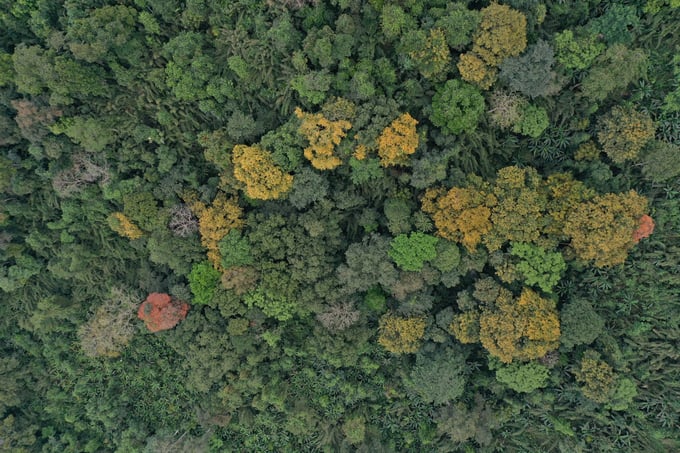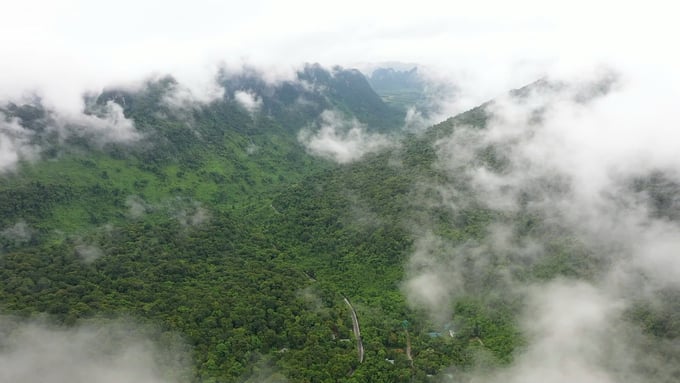November 20, 2025 | 10:53 GMT +7
November 20, 2025 | 10:53 GMT +7
Hotline: 0913.378.918
November 20, 2025 | 10:53 GMT +7
Hotline: 0913.378.918
On March 20, the Ministry of Agriculture and Rural Development issued Decision No. 816/QĐ-BNN-KL, announcing the national forest status for 2023. The forest area (including areas not meeting the canopy cover standard) was 14,860,309 hectares, with 10,129,751 hectares of natural forest and 4,730,557 hectares of planted forest. The area meeting the canopy cover standard was 13,927,122 hectares, with the national forest coverage rate at 42.02%.
A representative of the Forestry Department noted that forests absorb and store large amounts of carbon, making the forestry sector a net carbon sink (absorbing significantly more than it emits). This provides substantial potential for transferring emissions reduction results and trading forest carbon credits.
Based on MARD's 2022 statistics, Vietnam's Northeast, North Central, South Central, and Central Highlands regions show the greatest forest carbon potential.

Between 2021 and 2030, Vietnam could generate approximately 40-70 million forest carbon credits for trade on the global carbon market. Photo: Ngoc Diep.
In response to the ongoing climate emergency, Vietnam, like other countries, is actively pursuing greenhouse gas reduction activities and developing the carbon market. Vietnam is one of the few Asian countries to have established a legal framework recognizing the role of forest carbon in climate adaptation and mitigation and in carbon trading.
Between 2021 and 2030, Vietnam could generate approximately 40-70 million forest carbon credits for trade on the global carbon market.
From 2011, Vietnam has participated in the results-based payment program for REDD+ (Reducing Emissions from Deforestation and Forest Degradation). Under the Emission Reduction Payment Agreement (ERPA) for the North Central region, in 2023, Vietnam transferred 10.3 million tons of CO2 to the World Bank at USD 5 per ton, resulting in a payment of USD 51.5 million. Of this, 95% of the transferred amount will count toward Vietnam's Nationally Determined Contributions (NDC), placing Vietnam among the top 15 of 60 countries capable of selling carbon credits.
The Forestry Department stated that Vietnam is implementing the Agreement on Greenhouse Gas Emission Reduction Payments in the North Central region (currently institutionalized in Decree No. 107/2022/ND-CP dated December 28, 2022, by the Government), which is the ERPA (Emission Reduction Payment Agreement) signed on October 22, 2020, between the Ministry of Agriculture and Rural Development and the International Bank for Reconstruction and Development, part of the World Bank Group.
In 2023, for the first time in Vietnam, the forestry sector successfully transferred 10.3 million carbon credits from natural forests (equivalent to 10.3 million tons of CO2) for the period 2018-2024 to the World Bank at a unit price of USD 5 per ton.
To date, the Vietnam Forest Protection and Development Fund has received USD 51.5 million from the World Bank and has coordinated with six provinces in the North Central region to implement payments for eligible beneficiaries according to regulations.
The global carbon credit market reached a value of over USD 100 billion in 2023. With nearly 15 million hectares of forest, Vietnam has the potential to earn hundreds of millions of USD annually from selling carbon credits. This not only helps protect forests but also generates sustainable financial resources to support communities living near forests, while contributing to Vietnam’s commitment to achieving carbon neutrality by 2050.
According to the Department of Climate Change, Ministry of Natural Resources and Environment, green production and reducing greenhouse gas emissions are Vietnam's long-term commitments at COP26. The World Bank’s investment of USD 51.5 million to purchase 10.3 million carbon credits for the 2018-2024 period in the North Central provinces is a positive signal for the promotion of a carbon trading platform in 2025, creating financial resources for Vietnam. Part of this funding will return to support the North Central provinces in researching and developing policies to protect and develop forests, ensuring livelihoods for forest guardians.
To advacne the forest carbon market, it is necessary to update forest carbon standards, methods for calculating emission reduction results, and build a system for measuring and reporting emission reduction effectiveness from forests. Some managers and experts have proposed developing and piloting several potential projects, while also improving policies on the management and financial transfer of forest carbon credits.
The Ministry of Agriculture and Rural Development will implement an assessment of the potential for emission reductions and carbon absorption from forests at the national, regional, and local levels up to 2030, with consideration for the year 2050.

Global carbon market reached over USD 100 billion in 2023. Photo: Ngoc Diep.
Accordingly, emission reduction quotas from forests will be allocated annually to ecological regions and localities for the period 2021-2030 to achieve the Nationally Determined Contribution (NDC) targets. National standards for forest carbon credits will be developed, along with detailed regulations on the measurement, reporting, and verification systems for the amount of emission reductions/carbon absorption from forests.
Furthermore, Vietnam aims to create a database, registry, and management system for forest carbon credits and negotiate emissions reduction purchase agreements for the Central Highlands and South Central regions with the Emergent Finance Accelerator and other partners.
In parallel, Vietnamese ministries are building and refining the legal, technical, and institutional infrastructure to implement a domestic carbon market and participate in the global carbon market. Accelerating legal frameworks and detailed guidelines will help realize the government's goal of piloting a carbon credit trading platform by 2025, aiming for an official platform by 2028. This will allow Vietnam to fulfill its commitment to net-zero emissions by 2050, facilitating both domestic and international carbon credit exchanges.
Translated by Kieu Chi

(VAN) On November 19, the Agriculture and Environment Magazine held a workshop on regional linkages to advance green value chains in Viet Nam’s agriculture.

(VAN) 150 young delegates had the opportunity to meet and share initiatives aimed at enhancing knowledge and skills, working toward a climate-resilient and sustainably developed ASEAN.

(VAN) At COP30, Viet Nam emphasized that international decisions must be grounded in fairness, taking into account the capacities and needs of developing countries.

(VAN) Located downstream of the Ba Lai River, Vam Ho Bird Sanctuary is home to hundreds of birds and rare wildlife, preserving the ecological balance of a riverine region.

(VAN) Over two days of operations, Region 1 forest rangers dismantled nearly 10,000 meters of nylon nets and released dozens of trapped wild birds.

(VAN) Viet Nam is looking to expand its cooperation with the International Institute for Sustainable Development (IISD) on climate change adaptation and the development of a carbon market.

(VAN) The two sides expect the reciprocal trade agreement to be finalized soon, creating a foundation for agribusinesses to expand their cooperation.